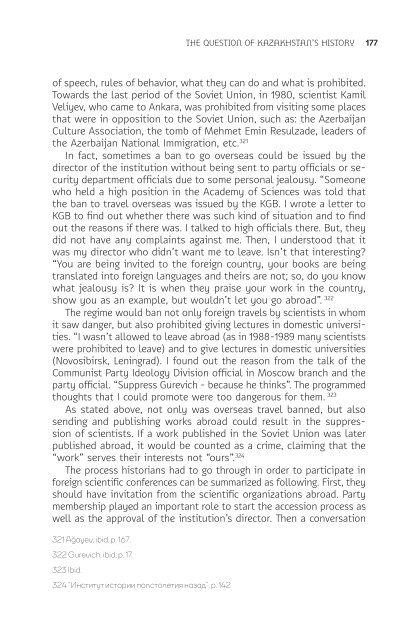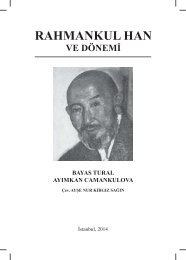THE SOVIET HISTORIOGRAPHY AND THE QUESTION OF KAZAKHSTAN’S HISTORY
SOVYET-TARIH-YAZICILIGI-ENG
SOVYET-TARIH-YAZICILIGI-ENG
You also want an ePaper? Increase the reach of your titles
YUMPU automatically turns print PDFs into web optimized ePapers that Google loves.
<strong>THE</strong> <strong>QUESTION</strong> <strong>OF</strong> <strong>KAZAKHSTAN’S</strong> <strong>HISTORY</strong> 177<br />
of speech, rules of behavior, what they can do and what is prohibited.<br />
Towards the last period of the Soviet Union, in 1980, scientist Kamil<br />
Veliyev, who came to Ankara, was prohibited from visiting some places<br />
that were in opposition to the Soviet Union, such as: the Azerbaijan<br />
Culture Association, the tomb of Mehmet Emin Resulzade, leaders of<br />
the Azerbaijan National Immigration, etc. 321<br />
In fact, sometimes a ban to go overseas could be issued by the<br />
director of the institution without being sent to party officials or security<br />
department officials due to some personal jealousy. “Someone<br />
who held a high position in the Academy of Sciences was told that<br />
the ban to travel overseas was issued by the KGB. I wrote a letter to<br />
KGB to find out whether there was such kind of situation and to find<br />
out the reasons if there was. I talked to high officials there. But, they<br />
did not have any complaints against me. Then, I understood that it<br />
was my director who didn’t want me to leave. Isn’t that interesting?<br />
“You are being invited to the foreign country, your books are being<br />
translated into foreign languages and theirs are not; so, do you know<br />
what jealousy is? It is when they praise your work in the country,<br />
show you as an example, but wouldn’t let you go abroad”. 322<br />
The regime would ban not only foreign travels by scientists in whom<br />
it saw danger, but also prohibited giving lectures in domestic universities.<br />
“I wasn’t allowed to leave abroad (as in 1988-1989 many scientists<br />
were prohibited to leave) and to give lectures in domestic universities<br />
(Novosibirsk, Leningrad). I found out the reason from the talk of the<br />
Communist Party Ideology Division official in Moscow branch and the<br />
party official. “Suppress Gurevich - because he thinks”. The programmed<br />
thoughts that I could promote were too dangerous for them. 323<br />
As stated above, not only was overseas travel banned, but also<br />
sending and publishing works abroad could result in the suppression<br />
of scientists. If a work published in the Soviet Union was later<br />
published abroad, it would be counted as a crime, claiming that the<br />
“work” serves their interests not “ours”. 324<br />
The process historians had to go through in order to participate in<br />
foreign scientific conferences can be summarized as following. First, they<br />
should have invitation from the scientific organizations abroad. Party<br />
membership played an important role to start the accession process as<br />
well as the approval of the institution’s director. Then a conversation<br />
321 Ağayev, ibid, p. 167.<br />
322 Gurevich, ibid, p. 17.<br />
323 Ibid.<br />
324 “Институт истории полстолетия нaзaд”, p. 142



